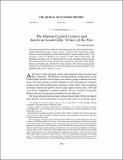| dc.contributor.author | Goldin, Claudia | |
| dc.date.accessioned | 2009-02-23T01:00:34Z | |
| dc.date.issued | 2001 | |
| dc.identifier.citation | Goldin, Claudia. 2001. The human-capital century and American leadership: Virtues of the past. The Journal of Economic History 61(2): 263-292. | en |
| dc.identifier.issn | 0022-0507 | en |
| dc.identifier.uri | http://nrs.harvard.edu/urn-3:HUL.InstRepos:2624681 | |
| dc.description.abstract | The modern concept of the wealth of nations emerged by the early twentieth century. Capital embodied in people—human capital—mattered. The United States led all nations in mass postelementary education during the “human-capital century.” The American system of education was shaped by New World endowments and Republican ideology and was characterized by virtues including publicly funded mass education that was open and forgiving, academic yet practical, secular, gender neutral, and funded and controlled by small districts. The American educational template was a remarkable success, but recent educational concerns and policy have redefined some of its “virtues” as “vices.” | en |
| dc.description.sponsorship | Economics | en |
| dc.language.iso | en_US | en |
| dc.publisher | Cambridge University Press | en |
| dc.relation.isversionof | http://dx.doi.org/10.1017/S0022050701028017 | en |
| dash.license | LAA | |
| dc.title | The Human-Capital Century and American Leadership: Virtues of the Past | en |
| dc.relation.journal | The Journal of Economic History | en |
| dash.depositing.author | Goldin, Claudia | |
| dc.identifier.doi | 10.1017/S0022050701028017 | * |
| dash.contributor.affiliated | Goldin, Claudia | |


